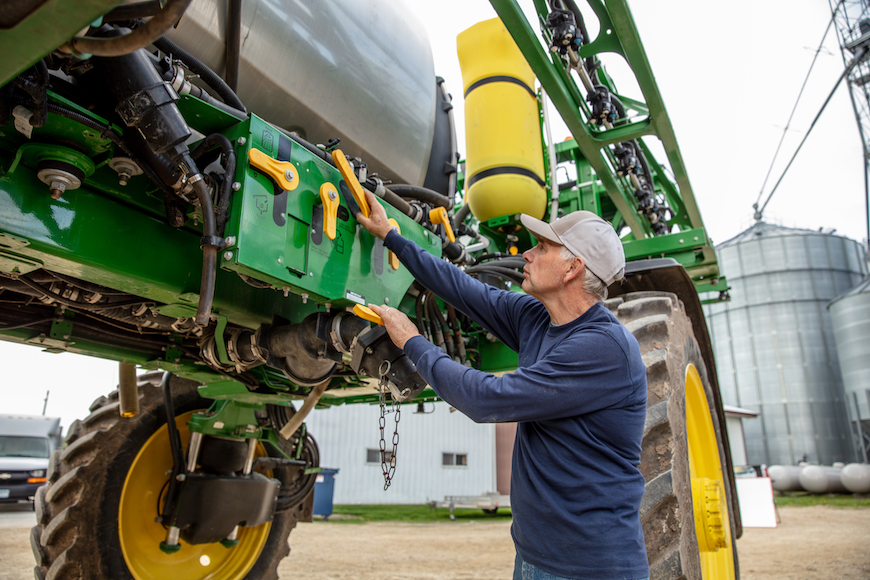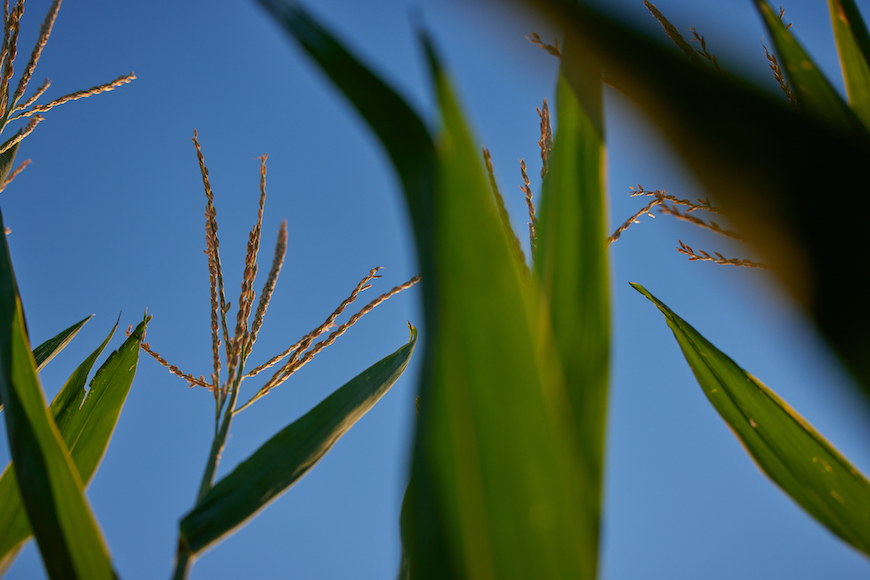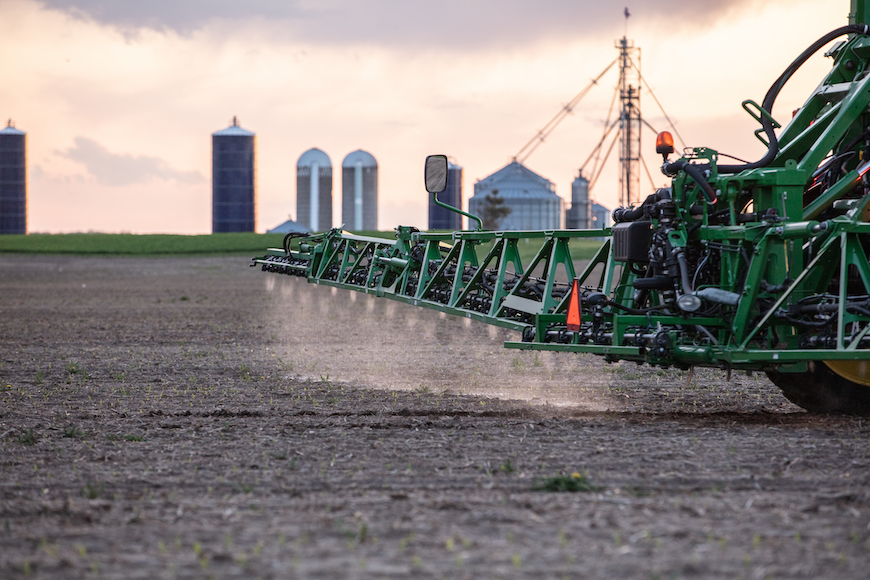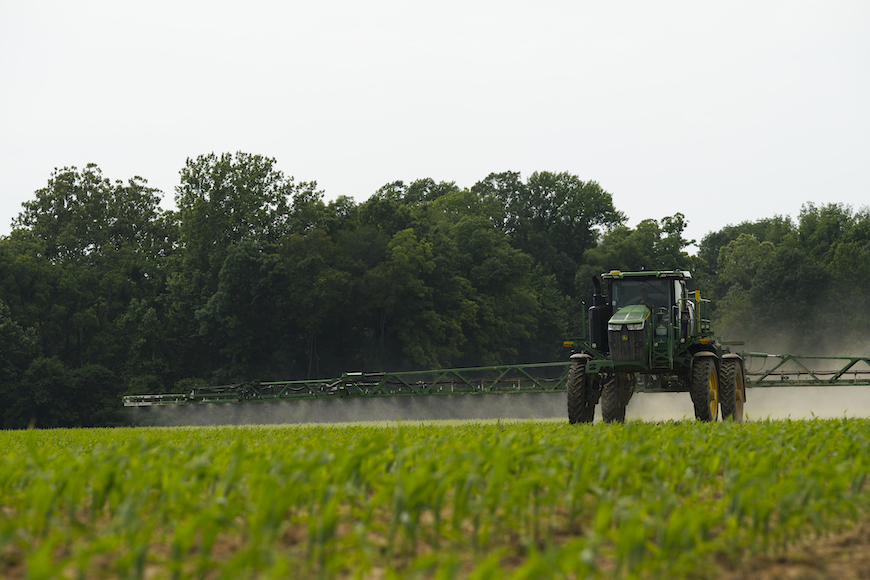Sep 25, 2025
Does Fall Burndown Pay Off?
Andy Schmidt
Market Development Agronomist

For growers who adopt minimum- or no-till practices, controlling weeds in the fall can be crucial — particularly for winter annual weeds like marestail, henbit, common chickweed and perennials (such as dandelions). If left unchecked, winter annual weeds and marestail can be more difficult to control in the spring.
Making a successful fall burndown herbicide application will help set you up for a cleaner, more timely start next spring, planting CROPLAN® seed.
- Smaller weeds: Winter annual weeds germinate in the fall, making them easier to control when they are young and actively growing.
- Increased control: During the fall, perennial weeds are translocating most of their nutrients to the roots for overwintering. This means more of the herbicide will move down into the roots and provide good control.
- Less compaction: If it is a dry fall, drier soil is better suited for sprayer traffic, minimizing compaction.
- Earlier planting: A weed-free field can dry and warm faster in the spring to allow for earlier planting and encourage stronger seed emergence.
- Greater efficiency: Equipment works better in clean fields, which will help streamline your trips across the field come spring, keeping you on schedule.
- Less weed competition: Early season weed competition is reduced to help crops get a good start and encourage uniform stands.
- Fewer pest havens: Fewer weeds mean fewer egg-laying sites for insects, such as cutworms, and no alternate host for soybean cyst nematodes.
Adding the right adjuvant to the fall herbicide tank mix can make applications more effective and boost overall ROI potential by helping herbicides stay on target and improving herbicide uptake. The use of an oil adjuvant, such as StrikeLock® adjuvant or Destiny® HC adjuvant, enhances herbicide effectiveness under cool temperature conditions and facilitates penetration, even through waxy leaf cuticles.
If a water conditioner is needed, Class Act® NG® adjuvant is an excellent option to condition the water and improve droplet spreading, especially when paired with InterLock® adjuvant. In fact, a study from Colorado State University shows Class Act NG adjuvant increased glyphosate uptake by 2.1x than AMS alone.1
Have additional questions about your burndown options? Contact your local retailer to learn more about making a successful fall burndown application.
1Colorado State University. Phil Westra research conducted in 2004.
All photos are either the property of WinField United or used with permission.
© 2025 WinField United. Important: Before use always read and follow label instructions. Crop performance is dependent on several factors many of which are beyond the control of WinField United, including without limitation, soil type, pest pressures, agronomic practices and weather conditions. Growers are encouraged to consider data from multiple locations, over multiple years and to be mindful of how such agronomic conditions could impact results. Class Act, CROPLAN, Destiny, InterLock, NG, StrikeLock and WinField are trademarks of WinField United. All other trademarks are the property of their respective owners.
Making a successful fall burndown herbicide application will help set you up for a cleaner, more timely start next spring, planting CROPLAN® seed.
Benefits of Fall Weed-Control Applications
There are several key advantages to using a fall burndown:- Smaller weeds: Winter annual weeds germinate in the fall, making them easier to control when they are young and actively growing.
- Increased control: During the fall, perennial weeds are translocating most of their nutrients to the roots for overwintering. This means more of the herbicide will move down into the roots and provide good control.
- Less compaction: If it is a dry fall, drier soil is better suited for sprayer traffic, minimizing compaction.
- Earlier planting: A weed-free field can dry and warm faster in the spring to allow for earlier planting and encourage stronger seed emergence.
- Greater efficiency: Equipment works better in clean fields, which will help streamline your trips across the field come spring, keeping you on schedule.
- Less weed competition: Early season weed competition is reduced to help crops get a good start and encourage uniform stands.
- Fewer pest havens: Fewer weeds mean fewer egg-laying sites for insects, such as cutworms, and no alternate host for soybean cyst nematodes.
Ensuring Fall Burndown is Effective and Cost-Efficient
One of the hesitations we most frequently hear in making a fall burndown application is cost. Luckily, a fall burndown application doesn’t need to be expensive to be effective. In contrast to a spring application, a fall burndown, even a late one, is likely to produce cleaner fields at a better price.Adding the right adjuvant to the fall herbicide tank mix can make applications more effective and boost overall ROI potential by helping herbicides stay on target and improving herbicide uptake. The use of an oil adjuvant, such as StrikeLock® adjuvant or Destiny® HC adjuvant, enhances herbicide effectiveness under cool temperature conditions and facilitates penetration, even through waxy leaf cuticles.
If a water conditioner is needed, Class Act® NG® adjuvant is an excellent option to condition the water and improve droplet spreading, especially when paired with InterLock® adjuvant. In fact, a study from Colorado State University shows Class Act NG adjuvant increased glyphosate uptake by 2.1x than AMS alone.1
Spring Application? Possibly.
Don’t forget to manage weeds into next spring, as well. Despite its benefits, fall burndown doesn’t eliminate the need for a residual herbicide program in the spring to achieve effective, season-long weed control.Have additional questions about your burndown options? Contact your local retailer to learn more about making a successful fall burndown application.
1Colorado State University. Phil Westra research conducted in 2004.
All photos are either the property of WinField United or used with permission.
© 2025 WinField United. Important: Before use always read and follow label instructions. Crop performance is dependent on several factors many of which are beyond the control of WinField United, including without limitation, soil type, pest pressures, agronomic practices and weather conditions. Growers are encouraged to consider data from multiple locations, over multiple years and to be mindful of how such agronomic conditions could impact results. Class Act, CROPLAN, Destiny, InterLock, NG, StrikeLock and WinField are trademarks of WinField United. All other trademarks are the property of their respective owners.
IF YOU LOVE OUR INSIGHT, YOU’LL LOVE OUR ROI POTENTIAL
Every successful harvest starts with a seed. It just can't end there. Choose which high-performing seed products you’ll start with this season.






